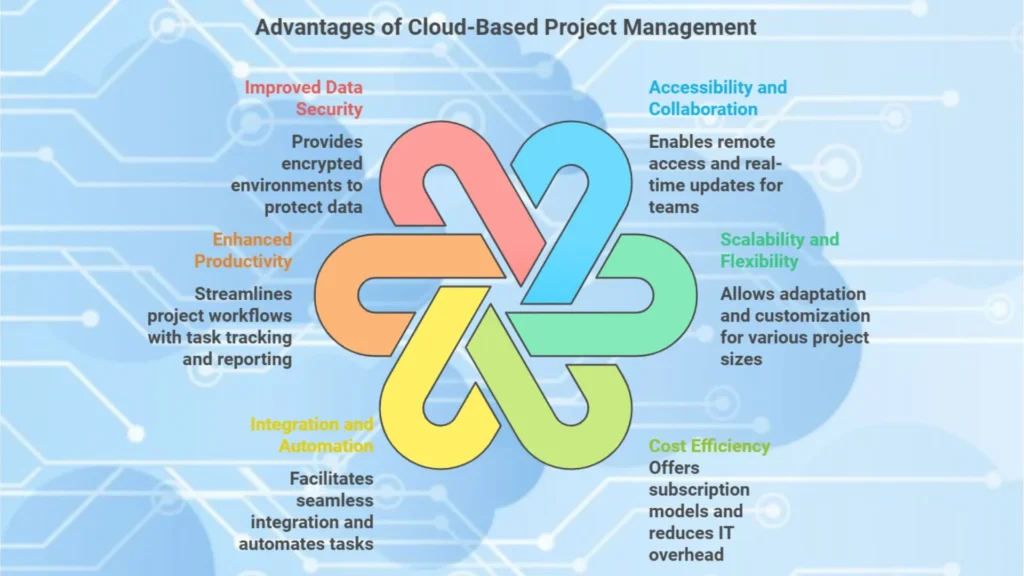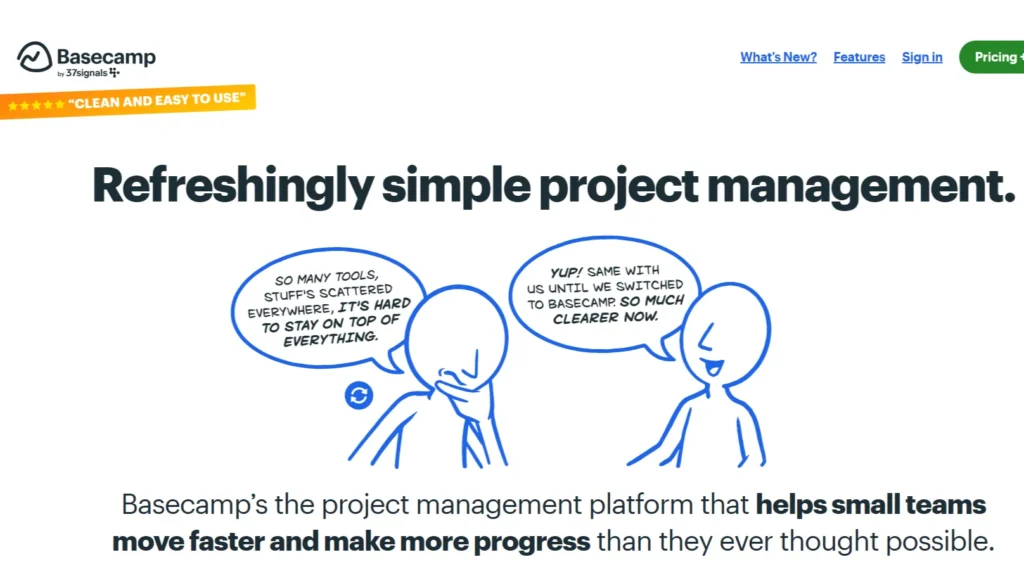The cloud based applications have transformed how businesses manage projects, collaborate remotely and improve productivity. Cloud based project management tools offer powerful solutions that support flexibility, real time collaboration and seamless data sharing, which improves overall project efficiency.
In this article, we shall discuss about top cloud based applications for Business and Project Management. Businesses using these tools benefit from secure cloud data storage, real time updates and scalable solutions that can grow with their needs.
Benefits of Cloud Based Project Management Tools

1. Accessibility and Collaboration
Remote Access: Team members can access project information from anywhere, which ensures seamless collaboration regardless of geographical location. Which saves the time of communication as well as follow-up with team as all team members are working together in collaborative manner.
Real Time Updates: Changes and updates are synchronized in real time, which allows all team members to stay on the same page.
2. Scalability and Flexibility
Adaptability: These tools can be scaled to fit projects of any size, from small teams to large enterprises.
Customization: Features and workflows can often be made suitable to meet the specific needs of different projects and industries.
Flexibility: Employees can access project files, track progress and communicate from anywhere. This again saves time and recourses.
3. Cost Efficiency
Subscription Models: Cloud based tools typically operate on a subscription basis, which allows businesses to manage costs effectively. This saves significant upfront investment.
Reduced IT Overhead: Eliminates the need for maintaining physical servers and hardware which reduces the burden on in house IT teams.
4. Integration and Automation
Integration with Other Tools: Many cloud based project management tools integrate seamlessly with other applications, such as email, CRM systems, and file storage services.
Automation: Streamlines repetitive tasks, which frees up team members to focus on more strategic activities.
5. Enhanced Productivity:
Integrated task tracking, scheduling and reporting make the project workflow streamlined and efficient. This enhances overall productivity of the team.
6. Improved Data Security:
Most cloud applications provide encrypted, secure environments for the data storage and data in transit. This reduces the risk of data loss and ensure data safety.
Top Cloud Based Project Management Tools
Here we shall look at some of the most popular cloud based project management applications. Each one offers unique features for businesses and teams:
1. Asana

Asana is a versatile tool with strong task management, timeline tracking and project workflows. It’s well suited for businesses that need a streamlined way to assign, track and manage tasks.
Features: Task management, project timelines, milestones and real time collaboration, workflow customization, deadline tracking and calendar views.
Pros: User friendly interface, customizable project views and strong integration with other tools like Slack and Google Workspace.
Cons: Limited advanced reporting features in the free version.
2. Trello

Trello offers a visual, board based system for organizing projects using cards and lists, ideal for smaller teams or those new to project management tools.
Features: Kanban style boards, task cards, checklists and due dates.
Pros: Intuitive drag and drop interface, easy to use and great for visual task management. customizable boards, and power ups for integrations with other applications like Dropbox and Jira.
Cons: May lack depth for complex project management needs.
3. Monday.com

Monday.com is a highly customizable tool that offers templates for various business functions beyond project management, such as sales, HR and operations.
Features: Customizable workflows, time tracking, project templates and task automation.
Pros: Highly customizable, strong automation features, color coded dashboards, time tracking, automated workflows and integration with platforms like Salesforce and Mailchimp.
Cons: Can be expensive for smaller teams.
4. Microsoft Teams

Microsoft Teams offers collaboration tools for businesses already using Microsoft 365, which makes it easy to integrate with other Microsoft products for streamlined project and document management.
Features: Collaboration hubs, chat, video conferencing, file storage and integration with Office 365.
Pros: Excellent for team communication, seamless integration with Microsoft products and strong security features.
Cons: May be overwhelming for new users due to its extensive features.
5. Slack

Slack is primarily a communication tool, it supports productivity with its integrations and customizable channels, which enables seamless collaboration and file sharing.
– Best for: Communication-focused project management with integration capabilities.
– Key Features: Channels, direct messaging, video calls and integrations with apps like Google Drive, Dropbox etc.
6. Basecamp

Basecamp is a simple project management tool which is clean and easy to use. This tool is suitable for small teams and businesses.
Features: To-do lists, scheduling, file sharing and team communication.
Pros: Simple and straightforward interface, fixed pricing model and all-in-one project management.
Cons: Limited customization options compared to other tools.
Benefits Cloud Based Project Management and Remote Collaboration
Cloud based project management enables teams to access, share and edit documents and data remotely, which is a must for geographically distributed teams. All files are stored in one place, accessible from any internet enabled device. Collaborative tools with real time updates eliminate the need for version control issues and reduce the risk of miscommunication. This supports project tracking with shared visibility.
Conclusion
Cloud based applications for project management allows businesses to streamline operations, improve collaboration, achieve scalability in most cost efficient way while maintaining secured centralized data. As cloud technology continues to evolve, these tools will remain essential for businesses adapting to remote and flexible work environments.
By selecting the right tool based on your specific needs, you can streamline your project workflows, improve team productivity and achieve better project outcomes.
Disclaimer: The websites mentioned above might evolve over time. Always refer to the website and their official documentation for the most accurate and updated information as well as latest offerings, plans and prices etc.


Thank you for sharing your personal experience and wisdom with us Your words are so encouraging and uplifting
Informasi kode pos kodepos seluruh wilayah indonesia